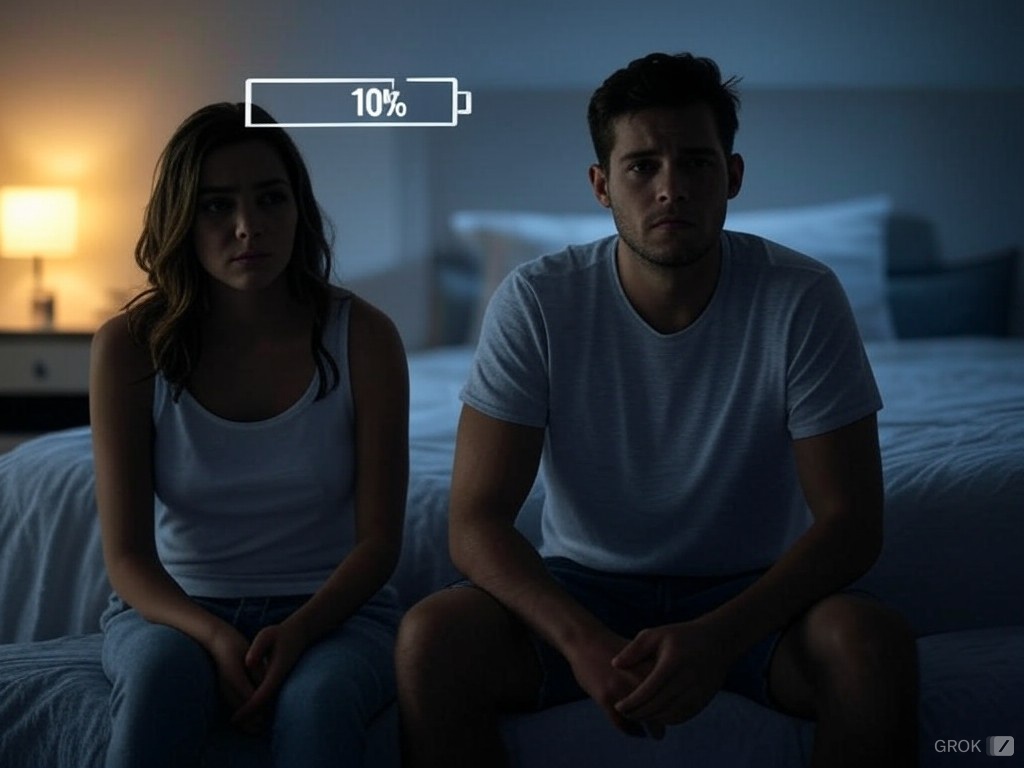Is adrenal fatigue draining our libido? When exhaustion, brain fog, and relentless stress take over, it’s no surprise our sexual energy takes a hit. But what if understanding this connection could help us reignite that spark? Let’s explore how our adrenal health impacts desire and what we can do about it.
Key Takeaways
- Adrenal fatigue significantly impacts libido by disrupting hormonal balance, leading to reduced sexual desire and energy levels.
- High cortisol levels from chronic stress suppress sex hormones like testosterone and estrogen, lowering overall sexual drive and creating physical and emotional disconnection.
- Common symptoms of adrenal fatigue-related low libido include extreme fatigue, brain fog, mood swings, performance challenges, and weight gain.
- Diet, sleep, moderate exercise, and stress management techniques like meditation and yoga can help restore hormonal balance and improve intimacy.
- Incorporating adaptogens (like ashwagandha) and essential nutrients (such as magnesium and omega-3s) supports adrenal health, enhances energy levels, and reignites the spark in relationships.
- Holistic approaches, such as lifestyle changes and mindful relaxation, are crucial in addressing adrenal fatigue’s physical and emotional effects on intimacy.
- Is adrenal fatigue draining our libido? When exhaustion, brain fog, and relentless stress take over, it’s no surprise our sexual energy takes a hit. But what if understanding this connection could help us reignite that spark? Let’s explore how our adrenal health impacts desire and what we can do about it.
Understanding Adrenal Fatigue and Its Impact on Libido
Adrenal fatigue throws a wrench into our energy levels and desire for intimacy. Think of it this way: the adrenal glands act like our body’s battery pack, fueling us through stress, excitement, and daily life. When those batteries run low, thanks to chronic stress or lifestyle demands, our sexual drive often takes a nosedive.
Stress hormones like cortisol, which the adrenal glands pump out, directly affect libido. Picture cortisol as an uninvited guest at a party—it dominates the room and leaves no space for the hormones that spark desire, like testosterone or estrogen. Over time, as cortisol levels stay high and adrenal function weakens, our natural sexual rhythm can feel entirely out of sync.
This exhaustion affects us not only physically but also mentally. Brain fog, a hallmark of adrenal fatigue, clouds our ability to stay present during intimate moments. If we’ve ever felt distracted or gone through the motions, adrenal fatigue might be the culprit. Pair that with constant tiredness, and it’s no wonder intimacy might start feeling like another box to check off at the end of a draining day.
Performance challenges can also creep in, from low stamina to difficulty achieving orgasms. These moments can create a vicious cycle where frustration feeds stress, and stress worsens the very symptoms we’re trying to combat. These physical and emotional barriers can create distance instead of connection for both men and women.
Reconnecting with our partner, even though adrenal fatigue requires more than motivation—it demands understanding what’s happening in our bodies. Once we identify the source, we can reignite our spark and refill those metaphorical batteries.
Common Symptoms of Adrenal Fatigue-Related Low Sex Drive
When adrenal fatigue creeps into our lives, it often affects our libido. This isn’t just an individual issue; it affects relationships, intimacy, and even the spark that keeps partnerships alive. Let’s look at the physical and emotional signals that may steal the magic from the bedroom.
Physical Symptoms
One of the most noticeable physical signs of adrenal fatigue is a drastic drop in sexual desire. Hormonal disruption plays the villain here, with stress-induced cortisol dominating over libido-enhancing hormones like testosterone and estrogen. Think of it as an unbalanced seesaw—the heavier cortisol tips the scale, making desire all but vanish.
Fatigue follows close behind. We’re not discussing the tiredness a good night’s sleep can fix. This bone-deep exhaustion leaves us too drained to even think about intimacy. Sleep issues, including restless nights or waking up feeling unrefreshed, only fuel the fire. Without energy in our reserves, even romance feels like climbing a mountain.
Metabolic changes can also signal trouble. Sudden weight gain, particularly around the midsection, often involves constant cravings for salty or sugary snacks. These shifts affect how we look and how we feel about ourselves, which can chip away at confidence in the bedroom.
Emotional and Mental Signs
On the emotional front, adrenal fatigue can cloud our minds with brain fog and dampen our moods. This mental haze makes intimacy feel more like an obligation than an exciting connection. Distracted or emotionally disconnected during intimate moments can create a growing relationship divide.
Stress and anxiety, adrenal fatigue’s constant companions, often surge when self-esteem takes a dip. Persistent worry over performance or body image can make sex feel more like a test we’re bound to fail than something to share and enjoy. Over time, this mental pressure sucks the joy out of closeness, leaving resentment or frustration in its place.
Irritability often rides shotgun with fatigue, setting us on edge when least expecting it. Minor annoyances can suddenly feel monumental, leaving little room for patience or affection. This emotional short fuse can make it harder to reconnect with our partners, even when the desire to do so is buried somewhere inside.
The Connection Between Stress Hormones and Sexual Health
Stress hormones disrupt our intimate lives, particularly affecting libido and connection. Chronic stress takes center stage, pulling the strings behind hormonal imbalances that can leave us feeling disconnected from ourselves and our partners. Let’s explore two key ways this happens.
Cortisol’s Role in Libido
Cortisol, the ultimate survival hormone, saves us during stressful situations. But it doesn’t leave quietly—it’s like that uninvited guest who overstays their welcome and steals the spotlight. When cortisol stays elevated for too long, it dampens testosterone production, the hormone responsible for fueling our sexual desire. Picture this: our bodies become so focused on surviving the storm that they forget to make time for sunshine and passion. This imbalance isn’t just about desire; it shifts our priorities, leaving sex and intimacy at the bottom of the to-do list. Chronic stress leads to lower energy and reduced libido, making that romantic spark feel like a distant memory.
Impact on Sex Hormone Production
Everything’s connected. Under prolonged stress, our adrenal glands divert resources to keep cortisol flowing. Still, there’s a downside—this process steals the raw materials needed to produce sex hormones like estrogen and testosterone. Imagine trying to bake a cake when all your flour’s been used to make bread; it’s hard to enjoy dessert when the resources are gone. For women, this drop in estrogen can lead to vaginal dryness, making intimacy less pleasurable, while men may experience lowered testosterone, directly impacting sexual function and drive. Together, these shifts can create emotional distance, further straining relationships. Balancing these hormones helps bring energy and intimacy back into alignment.
Natural Ways to Restore Hormonal Balance
Balancing hormones is key to regaining energy and reigniting intimacy. By nurturing our bodies with purposeful choices, we can support adrenal health and improve libido.

Diet and Nutrition
What we fuel our bodies with can lift or drag us down, especially regarding hormones. Stress pushes adrenal glands into overdrive, but the right foods can ease the burden.
Avoid Sugar and Refined Carbohydrates
Sugar isn’t as sweet as it seems regarding adrenal health. High sugar intake stresses our adrenal glands, boosting cortisol and sapping libido-boosting hormones like testosterone and estrogen. Instead, we should skip sugary desserts like sodas and pastries and choose naturally satisfying treats like fresh berries or dark chocolate.
Incorporate Healthy Carbohydrates
Whole, nutrient-rich carbohydrates help stabilize blood sugar, which keeps adrenal function in check. Imagine the vibrant crunch of leafy greens in a salad or the warm, earthy bite of quinoa paired with roasted veggies. These foods maintain steady energy while easing cortisol peaks and troughs.
The proper diet can refresh our system, allowing intimacy to thrive again.
Lifestyle Modifications
Lifestyle adjustments can reveal that spark we thought was lost, much like polishing a mirror. Let’s slow things down and reboot.
Prioritize Sleep
Poor sleep is exhausting and can kill one’s libido. When we stick to a relaxing bedtime routine, like indulging in lavender-scented baths or unplugging from screens, we ignite restorative sleep that tunes up hormone production.
Practice Stress Management
Chronic stress is like a thief, robbing us of passion. Calming activities such as yoga, meditation, or walking in nature help lower cortisol, increasing space for joy and connection. Picture a serene sunset stroll with your partner, hand in hand, as the day’s stress melts away.
Exercise Wisely
Overdoing workouts can exhaust the adrenal glands, so let’s focus on moderate, feel-good movement. Activities like Pilates or dancing keep us fit and make us feel alive and sensual again.
Small intentional shifts can restore our bodies while rekindling intimacy. By caring for ourselves, we naturally draw closer to those we love.
Holistic Treatment Approaches for Recovery
When adrenal fatigue zaps our energy and libido, holistic solutions offer a path to healing. Addressing physical and emotional well-being helps reignite the spark while supporting overall health.
Supplements and Adaptogens
Specific supplements and adaptogens can nourish our adrenal glands, reducing stress and restoring balance. Adaptogens like ashwagandha, rhodiola, and holy basil are known for their stress-fighting abilities. For example, ashwagandha can lower cortisol levels, helping the body relax and replenish strength over time. These unique herbs act like a soothing balm for overstimulated adrenal glands, creating harmony.
Magnesium, often dubbed the “anti-stress” mineral, can ease tension and improve sleep quality. Omega-3 fatty acids in fish oil capsules reduce inflammation, supporting both adrenal health and hormonal balance. For those exploring hormonal dips, zinc, and vitamin B5 offer additional support by stabilizing energy levels throughout the day. Incorporating these into our routines may take time, but the benefits last, making those intimate moments more enchanting again.
Stress Management Techniques
Stress management isn’t just about pausing; it’s about freeing our minds and taking time to connect with each other. Gentle practices like meditation help soothe the nervous system. Imagine sitting in a quiet space, focusing on your breath—it’s like hitting the reset button for the day. Couples could even take this time together, making mindfulness a shared experience.
Vacationing close to home or turning a regular weekend into a luxurious staycation creates a much-needed break to reconnect. Pair it with light, fun activities you both enjoy such as yoga or evening walks under the stars. Low-impact exercises like these lift moods without overstraining our bodies.
Let’s not forget laughter. Sharing a hearty laugh is a natural stress-buster and intimacy enhancer—whether from a cheesy rom-com or reminiscing about old inside jokes. These small, deliberate moments reduce the chaos in life, leaving more room for passion.
Conclusion
Adrenal fatigue drains our energy and can damage our relationships and intimacy. By understanding the impact of stress on our hormones and making intentional changes, we can start to rebuild our health and our connection with our partners.
Small steps like eating better, managing stress, and prioritizing rest can make a big difference. When we nurture our bodies and relationships with care, we create space for intimacy, passion, and joy to thrive again. Let’s remember it’s all about progress, not perfection.
References:
Tomas, C., Newton, J., & Watson, S. (2013). A Review of Hypothalamic-Pituitary-Adrenal Axis Function in Chronic Fatigue Syndrome. ISRN Neuroscience, 2013. https://doi.org/10.1155/2013/784520.
Chahal, H., & Drake, W. (2007). The endocrine system and ageing. The Journal of Pathology, 211. https://doi.org/10.1002/path.2110.










